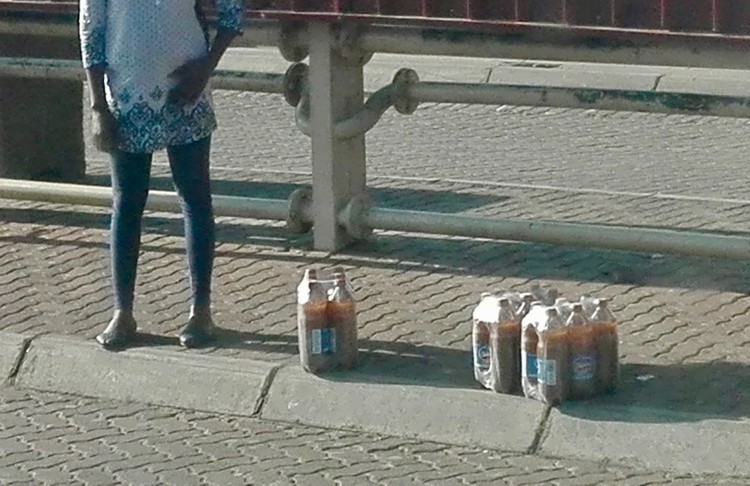How beer is smuggled across the border and sold in Springs
“This is real Zimbabwe beer, a sweet memory of home”
“Super is super. My profits are soaring,” says Tracy [not her real name]. Chibuku Super is a brand of opaque sorghum beer manufactured by Delta Breweries, Zimbabwe´s largest beer maker. Bottled in two-litre plastic bottles it is popular with Zimbabwean immigrants, many of whom are miners, living in towns such as Springs in Gauteng.
Tracy used to earn her livelihood by importing dried groundnuts from Zimbabwe to South Africa. Now she smuggles Super which she says is much more lucrative.
“We purchase Super beer in bulk at discount rates in Zimbabwe by lying to wholesalers that we are bar owners. Each bottle costs us just 70 US cents,” says Tracy. She sells it for US$2.50 (R33) a bottle in South Africa.
In Zimbabwe the beer crates are loaded into the cargo section of South Africa-bound buses. The legal limit for beer at the border is 2.5 litres per traveler. “As usual, bus drivers and touts are our salvation,” she says. “We pay them so that whenever they encounter Zimbabwe police roadblocks they lie that the beer is headed for Beitbridge and won’t cross into South Africa.”
At Beitbridge, people carry the beer on foot across the Limpopo River. “If the water levels in Limpopo are shallow, as they are now in summer, porters will charge us R100 for every 60 bottles they carry into South Africa,” she says. Smugglers, such as Tracy, don’t risk it themselves as there are robbers, known as amaguma-guma, who prey on immigrants crossing into South Africa through the dense bush. Instead, Tracy continues by bus.
“We complete all immigration passport formalities, and meet the beer couriers on South African territory, five kilometres outside Musina town,” she says.
Denis Juru of the Zimbabwe International Cross Border Traders Association Union in Musina says, “It’s crazy”. But it has “suddenly become a money spinner for porters who can brave crossing the Limpopo River on foot.”
The beer is then distributed in taxis.
Tracy says immigrants, many of whom mine for gold in abandoned shafts, are her main market.
Chenjerai Dzungu is one such miner. He is 19 and from Zimbabwe. “This is real Zimbabwe beer, a sweet memory of home,” he says. “Its taste is fluffy and smooth. Give me ten bottles of this beer and I can work under a gold mine for a week without thinking much of cooking meals.”
“It is sort of a prestige among us illegal miners to be seen in public waving a calabash of Zimbabwe Super beer here in South Africa,” says Dzungu.
Tracy describes business as brisk. “I can sell 100 bottles in a day,” she says. Some shebeens also buy the beer from her.
“Police here in Springs don’t care or know that this is beer. They just think these are opaque milk drinks,” she says. “It is not my duty to enforce rules, I am just a beer seller.”
Support independent journalism
Donate using Payfast

Letters
Dear Editor
I woke last Sunday in Boksburg North. I was offered a cup of tea which i vehemently refused. I took a cold shower, dressed up and fumbled around the sofa for the car keys, which i found.
Wondering where to go, i drove with my cousin 5kms approximately into Boks North. I walked along street shops looking for a cheap phone maybe from Pep Stores. Still somewhat sleepy, i entered one Pakistan shop. Then lo and behold ... the brown bottle looked at me: cheeky and full to the brim.
I went for 6 of them, retreated to the car, and got a run down my throat. Forget about the phone, i will buy it one day, but this Saturday I will be back in Boks North!
© 2017 GroundUp. 
This article is licensed under a Creative Commons Attribution-NoDerivatives 4.0 International License.
You may republish this article, so long as you credit the authors and GroundUp, and do not change the text. Please include a link back to the original article.

